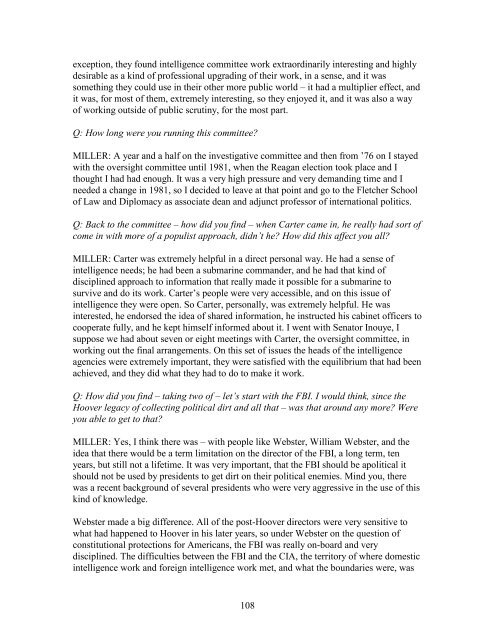1 The Association for Diplomatic Studies and Training Foreign ...
1 The Association for Diplomatic Studies and Training Foreign ...
1 The Association for Diplomatic Studies and Training Foreign ...
Create successful ePaper yourself
Turn your PDF publications into a flip-book with our unique Google optimized e-Paper software.
exception, they found intelligence committee work extraordinarily interesting <strong>and</strong> highly<br />
desirable as a kind of professional upgrading of their work, in a sense, <strong>and</strong> it was<br />
something they could use in their other more public world – it had a multiplier effect, <strong>and</strong><br />
it was, <strong>for</strong> most of them, extremely interesting, so they enjoyed it, <strong>and</strong> it was also a way<br />
of working outside of public scrutiny, <strong>for</strong> the most part.<br />
Q: How long were you running this committee?<br />
MILLER: A year <strong>and</strong> a half on the investigative committee <strong>and</strong> then from ’76 on I stayed<br />
with the oversight committee until 1981, when the Reagan election took place <strong>and</strong> I<br />
thought I had had enough. It was a very high pressure <strong>and</strong> very dem<strong>and</strong>ing time <strong>and</strong> I<br />
needed a change in 1981, so I decided to leave at that point <strong>and</strong> go to the Fletcher School<br />
of Law <strong>and</strong> Diplomacy as associate dean <strong>and</strong> adjunct professor of international politics.<br />
Q: Back to the committee – how did you find – when Carter came in, he really had sort of<br />
come in with more of a populist approach, didn’t he? How did this affect you all?<br />
MILLER: Carter was extremely helpful in a direct personal way. He had a sense of<br />
intelligence needs; he had been a submarine comm<strong>and</strong>er, <strong>and</strong> he had that kind of<br />
disciplined approach to in<strong>for</strong>mation that really made it possible <strong>for</strong> a submarine to<br />
survive <strong>and</strong> do its work. Carter’s people were very accessible, <strong>and</strong> on this issue of<br />
intelligence they were open. So Carter, personally, was extremely helpful. He was<br />
interested, he endorsed the idea of shared in<strong>for</strong>mation, he instructed his cabinet officers to<br />
cooperate fully, <strong>and</strong> he kept himself in<strong>for</strong>med about it. I went with Senator Inouye, I<br />
suppose we had about seven or eight meetings with Carter, the oversight committee, in<br />
working out the final arrangements. On this set of issues the heads of the intelligence<br />
agencies were extremely important, they were satisfied with the equilibrium that had been<br />
achieved, <strong>and</strong> they did what they had to do to make it work.<br />
Q: How did you find – taking two of – let’s start with the FBI. I would think, since the<br />
Hoover legacy of collecting political dirt <strong>and</strong> all that – was that around any more? Were<br />
you able to get to that?<br />
MILLER: Yes, I think there was – with people like Webster, William Webster, <strong>and</strong> the<br />
idea that there would be a term limitation on the director of the FBI, a long term, ten<br />
years, but still not a lifetime. It was very important, that the FBI should be apolitical it<br />
should not be used by presidents to get dirt on their political enemies. Mind you, there<br />
was a recent background of several presidents who were very aggressive in the use of this<br />
kind of knowledge.<br />
Webster made a big difference. All of the post-Hoover directors were very sensitive to<br />
what had happened to Hoover in his later years, so under Webster on the question of<br />
constitutional protections <strong>for</strong> Americans, the FBI was really on-board <strong>and</strong> very<br />
disciplined. <strong>The</strong> difficulties between the FBI <strong>and</strong> the CIA, the territory of where domestic<br />
intelligence work <strong>and</strong> <strong>for</strong>eign intelligence work met, <strong>and</strong> what the boundaries were, was<br />
108
















